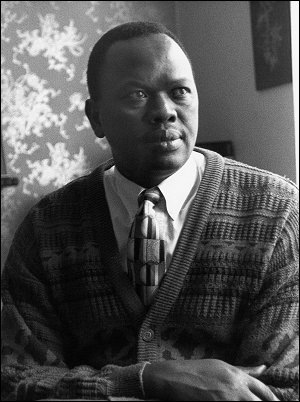Banak

Photograph, John Owens.
I come from a small town in southern Sudan called Malakal. Most of the people living in Malakal are fishermen and there are also many nomads in the surrounding area who care for cows and sheep. The town has very limited facilities and few paved roads.
I studied in Egypt and then returned to Malakal to practise as a veterinarian. But from that time on life was not easy. I was accused of collaborating with the rebel movement and inciting people to overthrow the government and went to prison. There was great confusion and fighting and, with no social organisation, my children were not able to get a proper education.
I realised that life in Sudan was not going to be easy for us so in 1993, I went to Egypt with my wife and my children, hoping to get asylum in another country. My application to the Australian Embassy was one of the fastest visas ever processed in Cairo and in late 1993 we arrived in Australia.
Australia is very different from Sudan. Life here is fast and well organised. In my country, if you make an appointment at ten o’clock, people will usually call one or two hours later. We call it Sudanese local time! I am convinced that the Australian system is good because most people are honest and respect the system, which in return supports the people. Pamphlets produced by government agencies list peoples rights as well as their obligations. You need to serve as well as be served. I like that system.
As we became settled in Australia we decided to set up the Sudanese Community Association to look after south Sudanese people when they arrive in Melbourne. We pick up new arrivals at the airport, introduce them to the Migrant Resource Centre and the welfare system, help them with employment opportunities and interpret when necessary. We have also been successful in sponsoring refugees and special humanitarian immigrants from south Sudan.
Although I am a qualified veterinarian I have been unable to work in my profession in Melbourne because my qualifications are not recognised in Australia. I need to study and sit some more exams. I have been busy settling and supporting my wife and five children while at the same time trying to find time to study. This is why I am still working in a factory.
The feeling of homesickness weighed us down when we first arrived. We missed our families and the situation was compounded when family members became sick at home. We also missed our culture. I still miss the tribal celebrations when people marry and families gather at night to dance and beat drums. In Sudan we also have monthly cultural shows when neighbourhoods sit down and talk about their culture and tell stories. These shows are important because our people are still largely illiterate.
I have explained to my 14 year-old son that in Sudan he would now be a man. He would be initiated and be given the marks on his face, which show that he has made the transition from boyhood to manhood.
My wife and I speak Nuer with our children but I notice that their language is already slipping away and they now speak English better than we do. This is why we are planning to open a Nuer school to teach Nuer children about our culture and language. They want to become Aussies and that is fine but they must keep a little bit of our culture too.
I came to Australia to find a safe place for my children to get an education and to sit down and plan for the future of our family and our people. I hope to live in a peaceful manner without the cruelty and intimidation that I experienced in Sudan. I want to build a new life in Australia. This is a very good country and I think we may choose to live here forever. My children will almost certainly decide to stay here.
